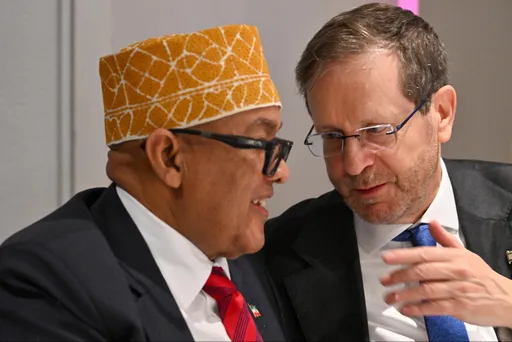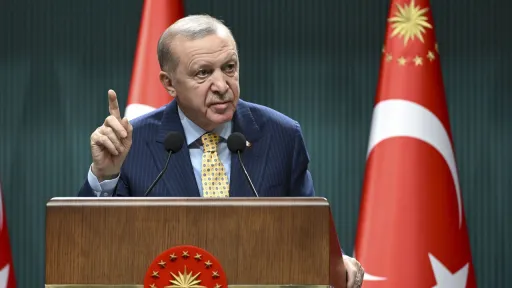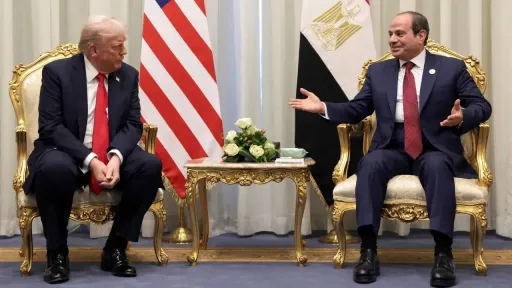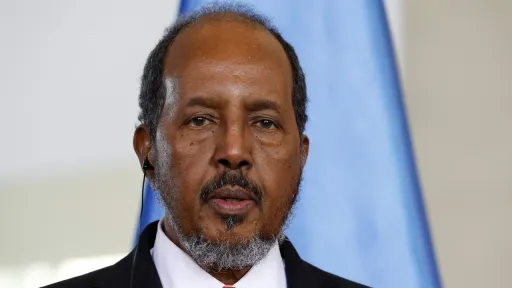As Israel's relentless genocidal assault on Palestine enters its second year, the United Nations General Assembly (UNGA) has become a platform for Africa to voice Gaza's pain.
Presidents, foreign ministers and envoys from countries spanning the Sahel to Southern Africa, and the Horn to West Africa, have lined up on the world's most prominent diplomatic stage to deliver a moral indictment of Israel for crimes against humanity.
Africa's unequivocal solidarity with Palestine is rooted in its own painful history of colonialism, apartheid and genocide.
In standing with Palestine, the continent is also reaffirming its commitment to self-determination, justice, and the rejection of colonial oppression.
Shared struggle
At the 80th UNGA session from September 23 to 29, African leaders harked back to a series of historical injustices to set the context for their condemnation of Israel.
Namibia's nightmare of German genocide against the Herero and Nama peoples, South Africa's scars from apartheid, Algeria's war of liberation – speaker after speaker illustrated how Gaza's plight is an extension of these very injustices.
President Netumbo Nandi-Ndaitwah of Namibia warned that "a failure to address the crisis in Gaza could become the moral failure that defines this era". She cited the UN Commission of Inquiry's findings, corroborating that "a genocide is being committed against the Palestinian people".
South African President Cyril Ramaphosa, whose government dragged Israel to the International Court of Justice (ICJ) in 2023, pulled no punches in his speech. "As Palestinians continue to face famine, we have a duty to act. South Africa has acted in the interest of saving lives by insisting that the ICJ make a ruling. And we stand here to say: it must stop."
Mohamed Siad Doualeh, Djibouti's permanent representative to the UN, described "the unspeakable horror of what's going on in Gaza", saying children were being assassinated with impunity each day while famine was being used as a weapon of war.
"The international community is unable to effectively stop the genocide that's underway," he rued.
Israel must bend
African leaders at the conference weren't all fire and brimstone. Many of them pushed for a roadmap to end the genocide, with Nigerian Vice-President Kashim Shettima pitching the two-state solution as "the most dignified path to lasting peace for the people of Palestine".
"The people of Palestine are not collateral damage in a civilisation searching for order. They are human beings, equal in worth, and entitled to the same freedoms and dignities that the rest of us take for granted," he said.
Sudan's transitional Prime Minister Kamil El-Tayeb Idris linked regional stability to Palestinian sovereignty. "Stability won't be achieved in the region without a just and permanent settlement of the Palestinian issue, including the establishment of an independent, sovereign Palestinian state with Al-Quds as its capital."
President Duma Boko of Botswana noted shifting Western positions, welcoming decisions by the UK, Australia, Canada and France "to give heightened attention and consideration to the Palestinian crisis".
"The carnage in Gaza must prick our collective conscience. We stand in solidarity with the suffering Palestinian people," he said.
Chronicles of carnage
According to Gaza's health ministry, more than 66,000 Palestinians have been killed by Israeli forces since October 2023, most of them women and children. At last count, 453 have died from starvation, which the UN and aid groups attribute to Israel withholding food and fuel.
Healthcare is in a shambles. Israel has repeatedly bombed hospitals in the name ofstriking at Hamas, leaving the entire region without even emergency medical assistance.
Egypt's foreign minister Badr Abdelatty made an impassioned appeal for the crimes against hapless Palestinians to stop.
"Our Palestinian brethren are falling victim to the most heinous Israeli actions. It is a war waged against defenceless civilians for sins they didn't commit, driven by an extremist ideology that only sees destruction and systematic starvation. Two years of wanton aggression have threatened the very foundations of peace we have been building for 75 years," he said.
Amid the groundswell of anti-Israel sentiment, President William Ruto of Kenya sought to strike a balance by also calling for the release of Israeli hostages. He argued that the international code of conduct governing "protection of civilians and respect for humanitarian law cannot be applied selectively".
Ruto demanded a permanent ceasefire between Israel and Hamas and the launch of a credible political process for the proposed two-state solution to be feasible.
Ghana's President John Dramani Mahama said suggestions that Palestinian statehood would be "a reward for Hamas" were as damaging as Israel's relentless targeting of innocents. "Contrary to the claims of some, a two-state solution would save hundreds of thousands of innocent women and children who are facing collective trauma, including starvation."
Mahama also slammed the US's reported denial of visas to a delegation led by Palestinian President Mahmoud Abbas as "a precedent that should worry us all".
"For nearly two years, we have been playing hide and seek with language to excuse what we all know is taking place in Gaza. But here's the thing: if it looks like a duck, swims like a duck, and quacks like a duck, then it must be a duck. The crimes in Gaza must stop," he said.
Continental weight
Africa's stand against Israel has institutional backing. Twenty-seven of the 57 members of the Organisation of Islamic Cooperation (OIC) are African. So are ten of the Arab League's 22 states.
Both blocs have consistently backed Palestine, with the OIC convening emergency sessions and the Arab League demanding humanitarian access.
This year alone, over 150 countries have reaffirmed Palestine's right to statehood. While Washington and a handful of allies continued shielding Israel, momentum has shifted towards what leaders called "the global majority".
As South African President Ramaphosa pointed out, Palestine is at an inflection point, just as his country was after decades of fighting apartheid. "The world once said, 'Never again'. Today, in Gaza, that promise is being broken. We have a duty to act."
























